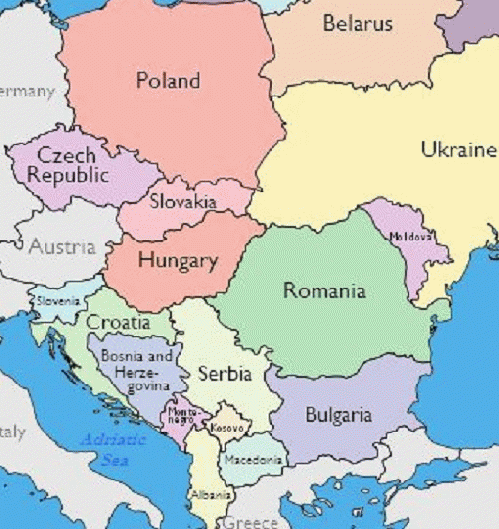JJohn Feffer's Aftershock : A journey into eastern europe's broken dreams(Zed, 2017) is an epic tour through the remains of the Warsaw Pact countries, history through the eyes of those both making and enduring it. It's full of surprising twists, with chameleons changing colours, marauding western bullies, lots of nostalgia for 'real existing socialism', hints of new political seeds pushing through what is now a bleak wasteland with nodes of renewal.
Feffer is one of the new breed of journalist-historians, postmodern in his goal of seeing history through the eyes of those living it. His inspiration is surely the Belarusian Svetlana Alexievich, awarded the 2015 Nobel Prize in Literature "for her polyphonic writings, a monument to suffering and courage in our time". Her equally epic Second-hand Time follows hundreds of Russian and other (ex)soviet interviewees from the 1980s to the 2010s.
This way of writing history is hard work, more reminiscent of Ibn Batutta,
who traveled the civilized world in the 14th century (Europe he regarded as uncivilized), recording his meetings with hundreds of locals. Aftershock is messy and sprawling, covering economic shock therapy, collapse and rebuilding of institutions, lots of rape and pillage, as befits the plight of a defeated 'enemy', for whom no remorse or pity is in store.
It cries out for some focus to juggle the main themes of socialism vs capitalism vs nationalism, political chicanery vs the struggle to re-establish some kind of morality and ethics. There is so much history (5 nations + 5 Yugoslav republics) packed into its pages that the head spins.
We in the West bemoan those greedy locals who took advantage of the collapse of socialism to enrich themselves, but as I read Aftershock, I pictured the biggest bad guys as western briefcase warriors marching triumphantly into Budapest or Ljubljana with magic potions and play money, making deals, using flimsy new 'banks' to spirit out proceeds, working with would-be local robber barons as frontmen, bankrupting and stripping old factories, with sexy vamps clinging to their arms, even taking orphan children for adoption. A sophisticated version of Roman or Mongol liberations of the past: slaughter the men, or take them, the women and children as slaves.
TINA failed
Feffer's stark conclusion at each of his stops: the Liberal project -- Thatcher's 'There Is No Alternative' -- failed. Eastern Europe was to be the poster child for the thesis that history had ended. Communism would be replaced by McDonalds and the voting booth. Accountable government, protection of civil liberties, tolerance, rule of law, blah, blah.
But it turns out it was wrong to throw the communist baby out with the bathwater in 1991. There was hidden social-justice treasure there. And change had been fermenting since the Prague Spring in the 1960s. Hungary, Czechoslovakia, Poland, Yugoslavia had lots of unofficial life, but it was done discreetly, best without western governments and NGOs loudly pushing their own agendas.
In 1979 Hungarian dissidents and party intellectuals -- really the same 'class'-- wanted to collaborate to change system from within. Reform-oriented technocrats and dissidents would quietly take power. Technocrats were gingerly allying with intellectuals in opposition.
This was no longer the revolution eating its children, as happened in the Stalinist 1950s, even with the explosion of Solidarnost' in 1980. Yes, dissidents worked as gardeners and wrote their screed for samizdat or tamizdat.* The socialist world was slowly transforming. If the West was sincere about helping out, it didn't need to destroy the system to save it.
The Liberal strategy: sell off state properties, use cheap labor, resources and tax breaks to attract foreign investment -- capitalist democracy. No Marshall plan would be necessary (except a harshly imposed one for East Germany to obliterate all evidence of the past), no western altruism.
The reality: cynical local officials sided with dissident intellectuals (what do they know about economics anyway?), but with no pretense of socialism anymore. They merely used this unholy alliance to 'privatize' (i.e., seize) state property and give a few crumbs to the dissidents, who had the choice to climb on board the gravy train or take the moral high ground and remain marginalized.
Yugoslavia should have been the success story. Already lots of market relations, used to dealing with the EU, culturally open, a federation. But the EU and US supported nationalists** pushing for state elections before federal elections could be held. This of course undermined desperate attempts to keep the federation in tact. The result was a nightmare, but convenient for the EU, which no longer faced the 'spectre of communism' from within. The five states limped towards a Pyrrhic victory (for whom?), meekly joining the EU, with Serbia still in the cold.
After Yugoslavia, Hungary stands out as the saddest case. After the 1956 explosion, the Communists were following a Yugoslav model, though the moderate Kadar kept the collective farm structure. Hungarian culture flowered -- the best (probably) in all Europe. Borders were open enough to let off intellectual steam, but so as not to subvert socialism, which its collapse in 1989 showed is a fragile political and economic system, easily undermined (unlike capitalism).
The living standard was at least as high as the European average, food was almost all locally grown (no Monsanto), life was kinda lazy, no stress as there was no unemployment, and health, education, books and entertainment virtually free. The opposition turned the light state control into a positive spur for resistance and critical films, by now, the leading form of cultural expression. The Istvans didn't need much to satisfy their basic needs. No consumer madness. People were judged by who they are and their deeds.
(Note: You can view every article as one long page if you sign up as an Advocate Member, or higher).






